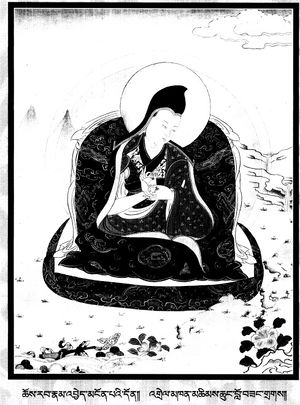Chim Lozang Drakpa: Difference between revisions
Jump to navigation
Jump to search
(Created page with "'''Chim Lozang Drakpa''' (Wyl. ''mchims blo bzang grags pa'') (1299-1375) — also known as The Omniscient Chim. He is the author of the most famous Tibetan commentary on...") |
m (resize picture) |
||
| (2 intermediate revisions by 2 users not shown) | |||
| Line 1: | Line 1: | ||
'''Chim Lozang Drakpa''' ([[Wyl.]] ''mchims blo bzang grags pa'') (1299-1375) — also known as The Omniscient Chim. He is the author of the most famous Tibetan commentary on [[Vasubandhu]]'s ''[[Abhidharmakosha]]'', [[An Ocean of Excellent Explanations Clarifying the Abhidharma Kosha]], often known simply as 'Chim Chung'. It is known as 'the smaller commentary', since it is a concise commentary much smaller in size as compared to the commentary [[The Ornament of Abhidharma]], by his student [[Chim Jampé Yang]]. | [[image:Chim_Lozang_Drakpa.jpg|thumb|300px|Chim Lozang Drakpa]] | ||
'''Chim Lozang Drakpa''' (Tib. མཆིམས་བློ་བཟང་གྲགས་པ་, [[Wyl.]] ''mchims blo bzang grags pa'') (1299-1375) — also known as The Omniscient Chim. He is the author of the most famous Tibetan commentary on [[Vasubandhu]]'s ''[[Abhidharmakosha]]'', ''[[An Ocean of Excellent Explanations Clarifying the Abhidharma Kosha]]'', often known simply as 'Chim Chung'. It is known as 'the smaller commentary', since it is a concise commentary much smaller in size as compared to the commentary ''[[The Ornament of Abhidharma]]'', by his student [[Chim Jampé Yang]]. | |||
==External Links== | ==External Links== | ||
Latest revision as of 18:21, 27 October 2017

Chim Lozang Drakpa (Tib. མཆིམས་བློ་བཟང་གྲགས་པ་, Wyl. mchims blo bzang grags pa) (1299-1375) — also known as The Omniscient Chim. He is the author of the most famous Tibetan commentary on Vasubandhu's Abhidharmakosha, An Ocean of Excellent Explanations Clarifying the Abhidharma Kosha, often known simply as 'Chim Chung'. It is known as 'the smaller commentary', since it is a concise commentary much smaller in size as compared to the commentary The Ornament of Abhidharma, by his student Chim Jampé Yang.